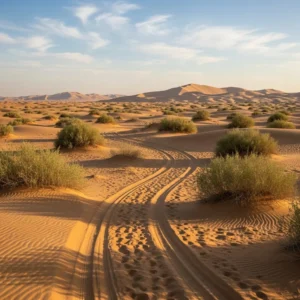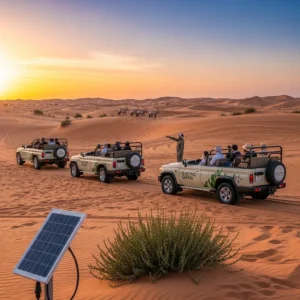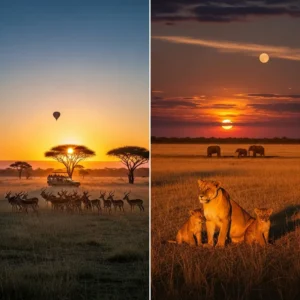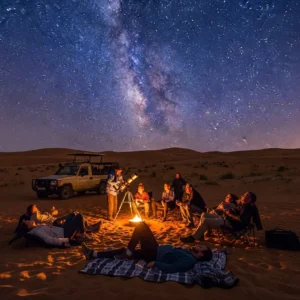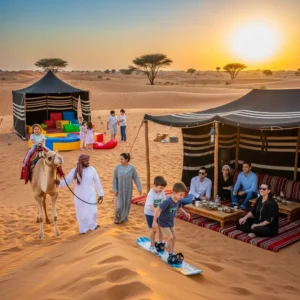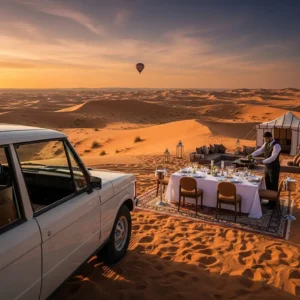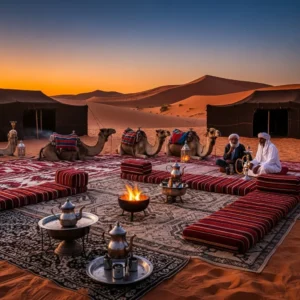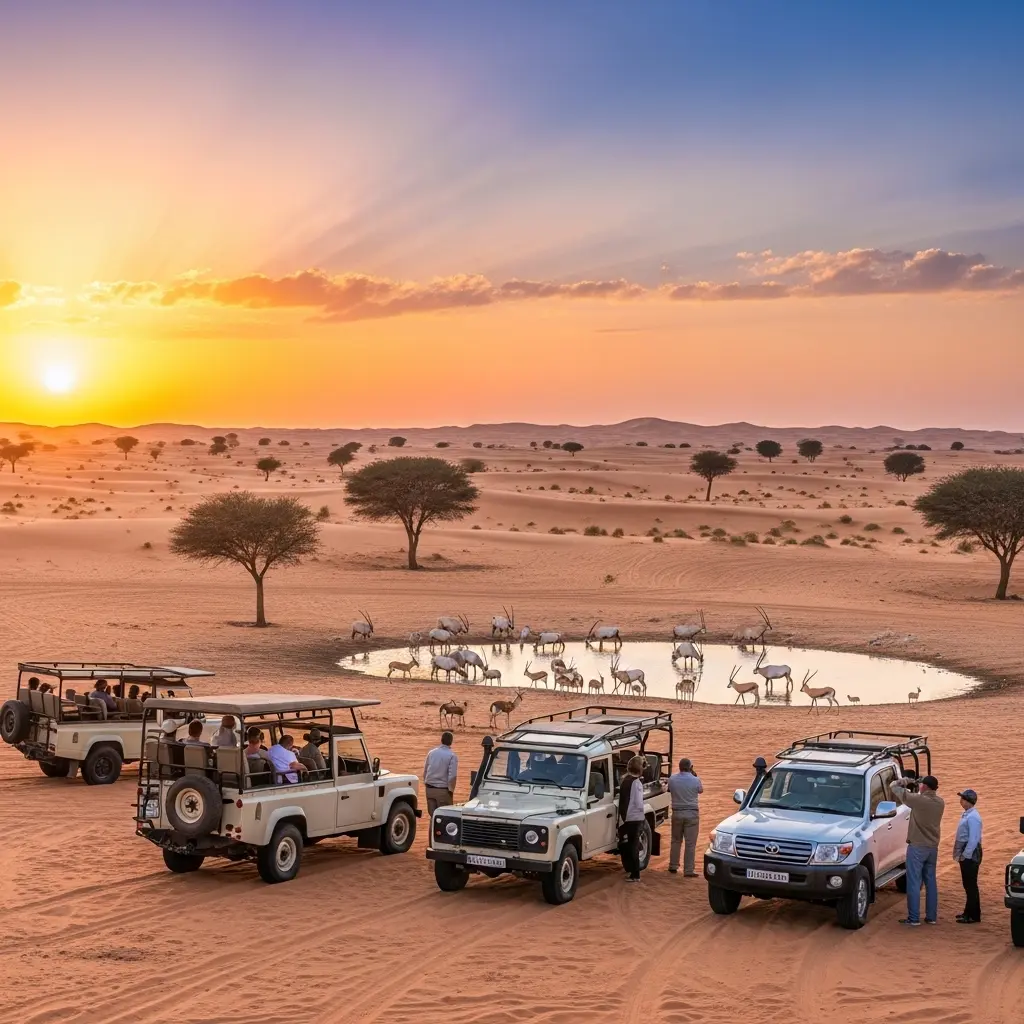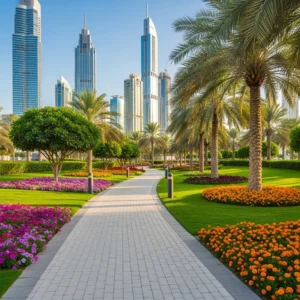Unveiling 7 Hidden Gems of an Al Marmoom Reserve Safari Adventure
When you picture a Dubai desert safari, you likely imagine the thrilling rollercoaster of dune bashing over fiery red sands. While that is a classic and incredible adventure, for the traveler seeking a deeper, more authentic connection to the Emirates’ natural and cultural soul, a hidden gem awaits: the Al Marmoom Reserve safari.
This is the desert experience for the conscious traveler, the nature lover, and the cultural enthusiast. Al Marmoom, the largest unfenced nature reserve in the UAE, offers a journey that prioritizes sustainability, wildlife, and the preservation of the rich Bedouin heritage. It’s a safari that moves at a different pace, swapping high-octane thrills for serene beauty and profound cultural immersion.
This guide will take you off the beaten path to unveil the seven hidden gems that make an Al Marmoom Reserve safari a truly unique and unforgettable adventure. Prepare to discover a side of the Dubai desert you never knew existed.
What is the Al Marmoom Desert Conservation Reserve?
Before we explore its treasures, it’s important to understand what makes Al Marmoom so special.
Dubai’s Unfenced Wilderness
Spanning an impressive 10% of Dubai’s total land area, the Al Marmoom Desert Conservation Reserve is a vast, protected landscape. Unlike other reserves, it is unfenced, allowing wildlife to roam freely as they have for centuries. It’s a living ecosystem where nature takes center stage.
A Focus on Heritage and Sustainability
The mission of Al Marmoom is twofold: to protect the region’s precious biodiversity and to preserve and celebrate the authentic desert-based lifestyle and heritage of the Bedouin people. A tour here is as much a cultural lesson as it is a nature walk, making for a truly enriching Al Marmoom Reserve safari.
The 7 Hidden Gems of an Al Marmoom Safari Adventure
An adventure in Al Marmoom is defined by unique experiences you simply won’t find on a standard safari tour.
1. The Al Qudra Lakes: A Desert Oasis Mirage
The first and most astonishing gem is the Al Qudra Lakes. This sprawling network of man-made lakes in the middle of the desert is a breathtaking, surreal sight.
- The Experience: Your journey into the reserve often begins here, where you’ll witness the incredible sight of shimmering blue water against a backdrop of golden sand dunes. The area is a vibrant ecosystem, a lush oasis that attracts a stunning variety of wildlife.
- The Famous Love Lake: Part of the network includes the famous Love Lake, two intertwined heart-shaped lakes that have become a beloved spot for residents and visitors alike.
- Birdwatcher’s Paradise: The lakes are a sanctuary for over 170 species of birds, including majestic swans, ducks, and even flocks of migratory flamingos that create a spectacular splash of pink against the desert landscape.
2. Abundant and Accessible Wildlife Encounters
Because Al Marmoom is a protected reserve, it is teeming with native Arabian wildlife. An Al Marmoom Reserve safari is a true wildlife-spotting adventure.
- The Arabian Oryx: The reserve is home to one of the region’s largest herds of the magnificent Arabian Oryx. Your guide, an expert in tracking and spotting these creatures, will take you to the areas where you have the best chance of seeing these iconic white antelopes.
- Gazelles and More: You are also very likely to spot herds of Arabian and Sand Gazelles gracefully navigating the dunes. The focus on a slow, respectful nature drive maximizes your chances of these incredible encounters.
3. A Deep Journey into Authentic Bedouin Culture
This is a core pillar of the Al Marmoom Reserve safari experience. The focus is on authentic cultural immersion, not just entertainment.
- The Bedouin Village: Your tour will often culminate in a visit to a meticulously recreated Bedouin village. Here, you will learn about the traditional way of life, from the construction of their tents (Bayt Al Sha’ar) to their daily routines and survival skills.
- Storytelling and Heritage: The guides are not just drivers; they are passionate storytellers. You will hear ancient stories, learn about the significance of the Ghaf tree, and gain a deep appreciation for the Bedouin’s profound connection to the desert.
4. The Al Marmoom Heritage Festival
If you can time your visit right (typically in March or April), you can witness a spectacular celebration of Emirati heritage.
- The Festival: The Al Marmoom Heritage Festival is a month-long event centered around the thrilling sport of camel racing. The reserve is home to a world-class camel race track, and witnessing a race is an unforgettable cultural experience.
- Beyond the Races: The festival also features traditional music and dance performances, bustling souks selling local handicrafts, and a vibrant atmosphere that celebrates all aspects of Bedouin culture.
5. Gentle, Scenic, and Educational Desert Drives
Unlike the high-speed thrill of dune bashing, the driving in an Al Marmoom Reserve safari is a different experience.
- A Nature Safari: The drive is slower, more purposeful, and focused on observation. Your guide will navigate the dunes with skill, but the goal is to find the best spots for wildlife viewing and to appreciate the subtle beauty of the landscape without causing unnecessary disruption to the environment.
- A Photographer’s Dream: This slower pace is perfect for photographers, offering ample opportunity to stop and capture the pristine dunes and the wildlife that inhabits them.
6. Truly Authentic Emirati Cuisine
The focus on authenticity extends to the culinary experience.
- The Meal: Instead of a generic international buffet, the meal on an Al Marmoom Reserve safari often features genuinely traditional Emirati dishes, prepared using authentic methods.
- The Setting: Enjoying this food in the setting of a traditional village, often accompanied by live cooking demonstrations, makes the meal a cultural experience in its own right, a true taste of Bedouin hospitality.
7. Unparalleled Stargazing Away From the Crowds
Because Al Marmoom is remote and the tours are more exclusive and less crowded, it offers a phenomenal stargazing experience.
-
The Dark Skies: Far from the light pollution of the city, the night sky is incredibly clear.
-
The Overnight Option: An overnight safari here is particularly special. After a traditional dinner, you can sit by a quiet bonfire and gaze up at a brilliant canopy of stars, enjoying a level of peace and tranquility that is hard to find.
How to Book Your Al Marmoom Adventure
Choosing the right operator is key to an authentic experience. Look for a company that specializes in heritage and eco-tours, like https://royaldesertadventures.ae/, as they will have the expert guides and the right philosophy for this unique reserve. When browsing on larger platforms such as https://dubaidesertsafarie.com/ or https://hafiztourism.com/, be sure to read the itineraries carefully to ensure you are booking a true Al Marmoom Reserve safari and not a standard tour.
Conclusion: The Desert’s Soulful Side
An Al Marmoom Reserve safari is an invitation to discover the quieter, more soulful side of Dubai. It’s an adventure that trades high-speed thrills for the deeper rewards of cultural connection, wildlife encounters, and the serene beauty of a protected landscape. For the traveler who wants to look beyond the surface and experience the true heritage of the Emirates, this hidden gem is an unmissable and profoundly enriching journey.
Frequently Asked Questions (FAQs)
1. Is there any dune bashing on an Al Marmoom Reserve safari? The focus in Al Marmoom is on gentle, scenic nature drives for wildlife spotting. While you will drive over beautiful dunes, it is not the high-speed, adrenaline-focused “dune bashing” that characterizes standard safaris. It is a much calmer and more observational experience.
2. How is Al Marmoom different from the Dubai Desert Conservation Reserve (DDCR)? Both are protected areas, but they have different focuses. The DDCR is fenced and highly regulated with a primary mission of ecological conservation and scientific research. Al Marmoom is unfenced and has a stronger focus on preserving the cultural and heritage aspects of the desert, such as the Bedouin lifestyle and camel racing.
3. Can I visit the Al Qudra Lakes on my own without a tour? Yes, the Al Qudra Lakes area is publicly accessible, and you can drive there with your own vehicle (a 4×4 is recommended for some areas). However, a guided Al Marmoom Reserve safari provides the benefit of an expert guide who knows the best spots for wildlife viewing and can offer deep insights into the ecosystem.
4. What is the Al Marmoom Heritage Festival? It is a major annual festival, usually held in the spring, that celebrates Bedouin traditions. The main event is the prestigious camel racing, but it also includes cultural performances, a traditional market (souk), and heritage displays. It is a vibrant and exciting time to visit.
5. Is an Al Marmoom safari better for families with young children? Yes, it is arguably a better choice for families with very young children or for anyone who is nervous about intense dune bashing. The calmer, nature-focused drive is very safe and gentle, and the cultural and wildlife aspects are highly educational and engaging for kids.
6. What kind of wildlife am I guaranteed to see? While no wildlife sighting is ever 100% guaranteed in a wild, unfenced reserve, the chances of seeing large herds of Arabian Oryx and gazelles are extremely high in Al Marmoom. The birdlife at Al Qudra Lakes is also a guaranteed and spectacular sight.
7. Is the camp experience the same as a standard safari? No, it is often more authentic. The focus of a Al Marmoom Reserve safari camp is on recreating a genuine Bedouin village experience. The food is more traditional, and the atmosphere is more about cultural education and storytelling than high-energy shows.
8. What should I bring that’s different from a standard safari? Binoculars are highly recommended for wildlife and bird spotting. A camera with a good zoom lens is also a great idea. Since the focus is more on nature, comfortable walking shoes are more important here than on a standard tour.
9. Are overnight safaris available in Al Marmoom? Yes, some specialized operators offer overnight experiences in Al Marmoom. This is a fantastic way to experience the tranquility of the reserve and enjoy some of the best stargazing in Dubai, far away from any light pollution.
10. Why is Al Marmoom described as a “hidden gem”? While it is a massive and significant area, it is far less known to tourists than the more common desert areas used for standard safaris. The tours here are more specialized and less commercialized, offering a more exclusive and “off-the-beaten-path” adventure.
11. Is falconry part of the Al Marmoom experience? Yes, many heritage-focused tours in Al Marmoom include a respectful and authentic falconry demonstration, which aligns perfectly with the reserve’s mission to preserve Bedouin traditions.
12. How long does a typical Al Marmoom safari last? The timings are similar to a standard evening safari, typically lasting around 6-7 hours. However, the content of that time is very different, with more time dedicated to slow-paced nature drives and cultural immersion.
13. Do I need to book an Al Marmoom safari further in advance? Because fewer operators are specialized in offering a true Al Marmoom Reserve safari, and the tours are often more exclusive with smaller groups, it is a very good idea to book in advance to secure your spot with a quality provider.
14. What is the best time of year to visit Al Marmoom? The winter and spring months (November to April) are the best. The weather is pleasant for wildlife spotting, and this period includes the Al Marmoom Heritage Festival, which is a major highlight.
15. Is the food in Al Marmoom different from a standard safari buffet? Yes, it is often more focused on authentic Emirati and Bedouin dishes. While you will still find delicious grilled meats, you are more likely to encounter traditional dishes like Machboos (spiced rice) or Harees (wheat and meat porridge) as part of the authentic Al Marmoom Reserve safari experience.
16. Are there camels for riding in Al Marmoom? Yes, camel riding is a key part of the heritage experience. The tours often include a longer, more scenic camel caravan trek through the reserve, rather than just a short ride around a camp.
17. Is the reserve well-maintained? Yes, Al Marmoom is a focus of Dubai’s conservation and heritage efforts. While it is an unfenced, natural environment, it is well-managed to protect its biodiversity and cultural sites.
18. What makes the stargazing special in Al Marmoom? Its remote location and the lower density of safari camps mean there is significantly less light pollution compared to some other desert areas closer to the city, making the sky darker and the stars appear brighter.
19. Is this tour more expensive than a standard safari? An Al Marmoom Reserve safari is often priced as a premium or heritage tour, so it may be more expensive than a basic budget safari. The price reflects the specialized nature of the tour, the expertise of the guides, and the exclusive, low-impact experience within the reserve.
20. Who should choose an Al Marmoom safari? This safari is perfect for second-time visitors to Dubai who want a different desert experience, nature and wildlife enthusiasts, families seeking a calm and educational outing, and any traveler who values authenticity and sustainable tourism over high-speed thrills.
